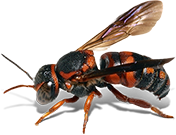 Associate Certified Entomologist (ACE) is the future of professional pest management. ACE certification can lead to better visibility, opportunities, and jobs.
Associate Certified Entomologist (ACE) is the future of professional pest management. ACE certification can lead to better visibility, opportunities, and jobs.
In today's increasingly complex and highly-specialized economy, credentials are important.
Sure, you know you’ve got the skills to do the job, but how do you convince potential customers and employers you're the best one for the job? For many career-minded pest management professionals, certification is often the answer.

The Entomological Society of America, long the industry leader in certification through its Board Certified Entomologist (BCE) program, also offers a certification option geared specifically toward the pest management industry. People become ACEs for a variety of reasons, but one thing is clear – the ACE program has become the benchmark for professionalism in the pest management industry.
- ACE is for those who are permanent residents of the United States and hold a current applicator's license.
- ACE-International is for those who are not permanent residents of the United States.
The ACE program is endorsed by the National Pest Management Association.
Why does ESA conduct a Certification Program?
Consumers seek experts for their pest management needs, but choosing a contractor can be confusing. The ACE program makes entomologically-based credentialling possible for those without a formal degree in entomology. This program is backed by the knowledge and experience of the largest insect-science program in the world which makes ACE perhaps the most trusted and respected title you can achieve in your pest management career short of an academic degree. The voluntary ACE credentialing program allows industry professionals a way to differentiate themselves from their competition.
Why should I become ACE Certified?
Many organizations (schools, multi-unit housing complexes, hospitals, government agencies, factories, homeless shelters, restaurants and food warehouses, etc) require independent certification for their contractors. Having an ACE certified professional on staff can give you/your company the edge it needs to compete successfully with other pest control providers. In addition, employees will benefit from an increased sense of pride and accomplishment when they achieve certification.
What are the benefits of ACE Certification?
In addition to the pride of professionalism earned by ACEs, there are some tangible benefits that allow these certified individuals to promote their accomplishment. Immediately upon passing their exam, ACEs are sent a uniform patch, window decal, and a certificate of accomplishment. They earn the right to display the letters ACE after their name (e.g., John Doe, ACE) and to begin to promote themselves as an "Associate Certified Entomologist" by using those words or the ACE logo in their promotional advertisements (employers can use the logo as long as they have one or more Associate Certified Entomologists on their full time staff). ACEs get discounts on ESA meeting registrations, have the opportunity to purchase and wear exclusive ACE-branded merchandise, and, upon request, receive assistance with reviewing submitted copy for electronic or print advertisements to help promote their certification.
Who can become an ACE?
Anyone can become an ACE, as long as they have a minimum of 5 years of verifiable pest management experience, a current pesticide applicator's license issued in the U.S., and the ability to pass a test on structural pest control knowledge. The major categories of competency covered by the ACE exam can be found here.
How do I prepare for the ACE exam?
This is not an exam that you can cram for. ACE tests a wide body of knowledge and applicants should prepare to spend a minimum of 40 hours of self-preparation no matter how long they have been in the industry. Experienced operators who are committed to continuing education and staying current in their profession should find the ACE exam challenging, but fair. It is designed to test practicing pest management professionals on the practical aspects of applied entomology. A set of topics on which the examination can be found here. In addition, our website provides a list of suggested references. Review classes may also be available in your area.
